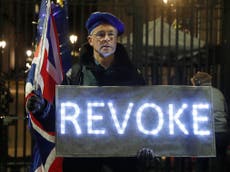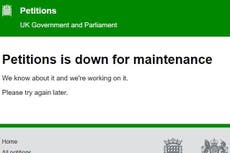As the Article 50 petition hits 3 million signatures, could it really unseat the PM and save Britain from Brexit?
Theresa May has proved beyond doubt, and in the most public manner possible, that she has completely lost it

As (yet another) metaphor for the crash that is Brexit, the collapse of the government petitions website under the weight of signatures calling for Article 50 to be revoked cannot be bettered.
Not only is the poor old country breaking under the strain of Brexit, but the very means by which we might look at some more radical solutions is itself out of service.
Politics is broken, this time literally, even if the site recovered in time to allow the petition to gallop past the one million mark. It was at 3,008,594 last time I looked.
As it happens, cancelling Article 50 – revoking it rather than extending it – is actually quite a sane and practical solution to the terrible pressure of time and events now closing in on us.
The one thing we need above all is the time and space to think.
Merely extending Article 50, we should remind ourselves, is something Britain cannot do unilaterally. We need the unanimous support of our EU partners (as they currently are) to agree to it, and they can specify whatever conditions and terms and length of extension they wish – or they can just refuse to entertain it.
Simply pulling our notice to cede from the EU is, by contrast, an option the UK can take for itself, even if the rest of the EU finds it annoying or outrageous.
We cannot be expelled from the EU for mucking about too much.
The truth is, at least with the benefit of hindsight, that we activated Article 50 before we were properly prepared. We had no plan, no agreed strategy, no contingency ideas – nothing. We simply had a set of red lines, as set out by Theresa May in her Lancaster House speech in January 2017.
Since then, the loss of her parliamentary majority in the snap election of 2017 (”“he revenge of the Remainers”), and a collision with economic and political reality have rendered most of them void; impractical, illogical and unrealistic. It was the longest lesson in history that you cannot have your cake and eat it. No end of a lesson, too.
What is needed now is for someone to wrest control of the process from the uncertain grip of the prime minster. Whatever personal efforts and commitment she has put into this, she is plainly not up to seeing it through.
The likes of Dominic Grieve, Oliver Letwin, Yvette Cooper, Vince Cable and others could and would be able to work with a more pragmatic premier to try and resolve matters in the national interest.
There are two options to consider.
First, the cabinet could say to her that the game is up, she needs to stand aside, and a new prime minister will have to take things over. We have no time for a lengthy Tory leadership election, so a new prime minister will have to be appointed from within the cabinet who can command the support, if temporarily, of the cabinet, parliament, and preferably, but not necessarily, the parliamentary Conservative Party.
It would have to be someone from within the cabinet, and a person who did not harbour long-term ambitions for themselves – a PM for Brexit only. The obvious figures here are David Lidington, the PM’s de facto deputy; or the chancellor Philip Hammond, traditionally the second most senior role in government, and the only member of the current cabinet with the wit openly to call for cross-party cooperation.
If needs be, May could carry on as leader of her party, formally, but not as head of the government. There are few constitutional precedents for this oddity, but then we are in uncharted territory. Desperate times demand desperate solutions.
A second route (which could run alongside a change of premier) would be for the Commons to once again assert itself and wrench control of the process from the PM. Just such a move was only very narrowly defeated in the Commons last week, and, given the ugly mood among MPs of all persuasions, the time may now be right for it to be put once again.
This would not, by the way, violate Speaker Bercow’s ruling on outing motions again because it is not being proposed by the executive in an attempt to bully parliament, but rather by the Commons itself.
The likes of Dominic Grieve, Oliver Letwin, Yvette Cooper, Vince Cable and others could and would be able to work with a more pragmatic premier to try and resolve matters in the national interest. It would be a weak form of national or coalition government, placed in charge of this single issue – Brexit. Unique, but perhaps necessary under such unprecedented conditions.
What would any of that achieve? By revoking Article 50 or by securing a much longer delay of 21 months or more (something the EU seem inclined to grant) we could make a better job of gaining parliamentary agreement for a deal that could be put to the EU – but also, crucially, be put to the people via a Final Say referendum.
Theresa May is not the right person to see this through. Like David Cameron, John Major and Thatcher before her, May’s premiership will have been broken by Europe.
We have before us even today another, even more obvious way out of the impasse: to pass Ms May’s deal but only on condition that it is put to a final referendum, so the people can approve, or not, the terms of Brexit as they stand now (or as they may stand in the future in any amended new deal).
This idea is embodied in the Kyle-Wilson amendment, and stands as the only way out if the options mentioned above are not palatable.
In a future referendum, “remain” should certainly be an option; “hard Brexit” might also be one of three to be placed before the electorate.
What is evidently not working is for parliament to be pitted against Downing Street; for the cabinet to be at war with one another; and for No 10 to try to pit the people against parliament, as May has sought to do.
A few weeks ago, there was a rumour that May wanted to pursue a “mad monk” strategy, whereby she would be seen as so irrational and so stubborn and so bloody-minded that the risk of a no deal/crash out Brexit would feel very real.
It was never a very credible notion, given May’s background, but it was supposed to scare everyone – the public, MPs, the EU – into bending to her will. Hence her extraordinary tantrum last night.
All she has succeeded in doing, however, is demonstrating in the most public manner possible that she has lost it.
Theresa May is not the right person to see this through. Her cabinet, following the example of Margaret Thatcher’s fall from power in 1990, needs to advise her to stand aside in the national interest.
Like David Cameron, John Major and Thatcher before her, May’s premiership will have been broken by Europe.
Better that, though, than breaking the country.





Join our commenting forum
Join thought-provoking conversations, follow other Independent readers and see their replies